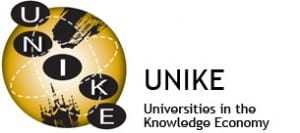Last month, University of Lincoln Marie Curie fellows Dr. Kwadwo Appiagyei-Atua and Dr. Klaus Beiter (both working with Professor Terence Karran) presented papers at the EU-funded UNIKE conference: Universities in the knowledge economy: Perspectives from the Asia-Pacific and Europe. Their panel focused on the state and politics of academic freedom in higher education in Europe and Africa, and in this context they presented initial conclusions from their respective research projects in the field.
Joss Winn and Sarah Amsler also presented their work on co-operative and alternative education in the ‘Alternative Ways of Thinking the University’ stream at this conference; read his blog on labour, property and pedagogy in co-operative education and her paper on popular higher education here.
Assessing reform and innovation in African universities against recent trends in respect for academic freedom (Kwadwo Appiagyei-Atua)
African universities and intellectuals, from the time of independence, have faced significant violations of academic freedom. With the return to democracy in the era of globalisation, African states have undertaken some major reforms to enable the university to meet the demands and concerns of the 21st century. The paper revealed, however, that the reform process is externally driven and in most cases that autonomy is granted in name only as governments have, in actual fact, not left the universities. Relying on data I have gathered over the past year as a Marie Curie Fellow working on a project on ‘Building Academic Freedom and Democracy in Africa,’ the paper reviews the level of respect for the four elements of academic freedom recognised in the 1997 UNESCO/ILO Recommendation Concerning the Status of Higher Education Teaching Personnel: individual freedoms, institutional autonomy, self-governance and tenure. It also analyses the violations recorded in a legal context to determine the culpability of African states under international law. The conclusion is that academic freedom is not properly positioned within the African university to enable it to act as a driver and facilitator of higher education reform efforts.
Read the full abstract.
“Measuring” academic freedom as an international human right: an assessment of the legal protection of the right to academic freedom in Europe (Klaus D. Beiter)
Academic freedom is generally recognised as a human right, both at the national and the international level. Focusing on Europe, specifically those countries that are members of the European Union, it may be observed that Academic freedom is generally recognised as a human right, both at the national and the international level. Focusing on Europe, specifically those countries that are members of the European Union, it may be observed that the right to academic freedom often has a basis in the constitutions and laws on higher education of these countries. The countries concerned are also bound under international human rights agreements, such as the International Covenants on Civil and Political and Economic, Social and Cultural Rights of 1966, respectively, or the European Convention on Human Rights of 1950, As will be shown in this article, on closer analysis – assessing merely the legal protection in EU Member States, an examination of the factual situation to be undertaken at a later stage – it appears, however, that increasingly merely lip-service is being paid to this important right. The results for different European countries have been quantified and the countries ranked in accordance with “their performance”. The assessment facilitates drawing conclusions as to the state of health of the legal protection of the right to academic freedom in Europe.
Read the full abstract.
Participate in the Academic Freedom Survey
